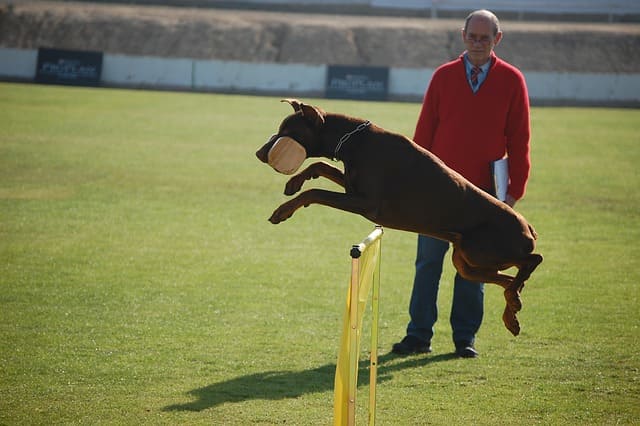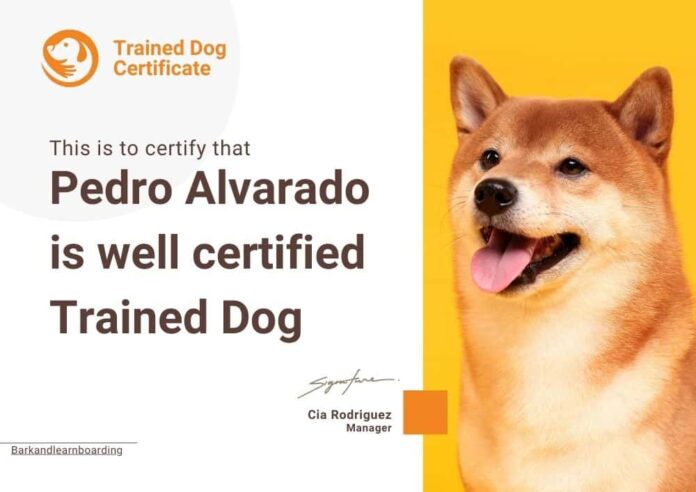Kickstarting your career as a dog trainer…?But do you have enough information about the best dog training certification programs?
If not, then this is for you.
Training your pet dog is not just about teaching to sit and stay; it’s about fostering understanding, communication, and trust between humans and their furry companions.
With the growing increasing demand for skilled and certified dog trainers, choosing the right certification program is crucial for aspiring professionals.
In the world of dog training, certification holds significant weight. Whether you’re a seasoned professional or a passionate newcomer, obtaining the proper certification can open doors, validate expertise, and elevate your career in the canine training industry.
But with a plethora of options available, finding the best dog training certification program can be daunting.
In this comprehensive guide, we’ll explore the top dog training certification programs, equipping you with the knowledge to kick-start your journey toward becoming a certified canine expert.
Importance of Certification in Dog Training:
Dog training requires expertise, extra patience, and a deep understanding and involvement with canine behavior.
In this world where dogs are not just pets but integral members of families, the demand for qualified dog trainers has skyrocketed.
While a passion for working with dogs is essential, formal education and certification provide aspiring trainers with the necessary skills and credibility to succeed in this competitive industry.
Certification not only validates your knowledge and proficiency but also instills confidence in your potential clients, showcasing your commitment to ethical and practical training practices.
Criteria for Evaluating Best Dog Training Certification Programs:
Before delving into the specifics of each program, it’s essential to establish the criteria for evaluating their effectiveness and suitability:
1. Accreditation:
Look for certification programs that are accredited by reputable organizations within the dog training industry.
2. Curriculum:
Assess the comprehensiveness and relevance of the curriculum, including topics such as canine behavior, learning theory, training techniques, and business management.
3. Practical Experience:

Consider programs that offer hands-on training opportunities and practical experience working with dogs under the guidance of experienced instructors.
4. Flexibility:
Evaluate the program’s flexibility in terms of scheduling, learning formats (online, in-person, or hybrid), and specialization options.
5. Reputation:
Research the reputation of the organization and the track record of the certification program, including reviews from past graduates and industry professionals.
Best Dog Training Certification Programs:
1. Certification Council for Professional Dog Trainers (CCPDT):
Established in 2001, the CCPDT is one of the most recognized and respected certifying bodies in the dog training industry.
Their certification program, known as the Certified Professional Dog Trainer (CPDT-KA), is accredited by the National Commission for Certifying Agencies (NCCA).
The CPDT-KA certification requires candidates to demonstrate their knowledge of canine behavior, training theory, and ethical practices through a comprehensive examination.
The CCPDT offers flexibility in exam preparation, with study materials, workshops, and webinars available to help candidates succeed.
Additionally, certified trainers must adhere to a code of ethics and must commit to continuing education to maintain their credentials.
2. International Association of Canine Professionals (IACP):
The IACP offers several certification programs for aspiring dog trainers, including the Certified Dog Trainer (CDT) and the Certified Dog Behavior Consultant (CDBC).
Their comprehensive curriculum covers obedience training, behavior modification, and client communication. What sets the IACP apart is its emphasis on practical skills and real-world experience.
Candidates are required to complete hands-on training and apprenticeships under the guidance of certified mentors, allowing them to apply their theoretical knowledge with practical skills in settings.
3. Karen Pryor Academy (KPA):
Founded by renowned animal trainer Karen Pryor, KPA offers a unique certification program focused on positive reinforcement training methods.
The KPA Dog Trainer Professional (DTP) program combines online coursework with hands-on workshops and mentorship opportunities.
KPA’s curriculum emphasizes the science of animal learning and behavior, teaching trainers to communicate effectively with dogs using reward-based techniques.
Graduates of the program earn the proud title of Certified Training Partner (CTP) and gain access to a support alumni network and continuing education resources.
4. Animal Behavior College (ABC):
ABC’s Dog Trainer Program is designed for individuals seeking a flexible and affordable option for pursuing certification in dog training.
The program combines online coursework with externship placements at local animal shelters or training facilities.
ABC’s curriculum covers a range of topics, including obedience training, behavior modification, and business management skills.
Graduates of the program achieve the title of Certified Dog Trainer (CDT) and receive job placement assistance to help jumpstart their careers in dog training.
4. Victoria Stilwell Academy for Dog Training & Behavior (VSA):
Founded by celebrity dog trainer Victoria Stilwell, VSA offers a comprehensive program that blends online learning with practical experience.
The curriculum emphasizes positive reinforcement techniques, force-free training methods, and understanding canine body language.
Students have the opportunity to work with shelter dogs and participate in real-world training scenarios to hone their skills.
Graduates of the program acquire the title of Certified Dog Trainer (VSA-CDT), reflecting their expertise in modern, science-based training methods.
5. National Association of Dog Obedience Instructors (NADOI):
For over 50 years, the National Association of Dog Obedience Instructors (NADOI) has been setting the standard for excellence in dog training education.
NADOI offers certification for both aspiring trainers and experienced instructors seeking to enhance their skills.
Unlike some other programs, NADOI certification requires candidates to have a significant amount of hands-on training experience.
Prior to applying, ensure that certified trainers possess the practical skills necessary to train dogs and support their owners effectively.
Conclusion:
Choosing the best dog training certification program is a significant step toward establishing a successful career in the canine industry.
Whether you’re passionate about obedience training, behavior modification, or working with special populations, there’s a certification program to suit your interests and goals.
By considering factors such as accreditation, curriculum, practical experience, flexibility, and reputation, you can make an informed, clear decision that sets you on the path to becoming a certified canine professional.
So, leash up your ambition and embark on a rewarding journey to unleash excellence in dog training.
FAQs
- What is a dog training certification program?
It’s a structured educational course that teaches the principles and techniques of dog training, covering behavior modification, handling, and communication.
- Why should I get certified in dog training?
Certification demonstrates competence, professionalism, and commitment to ethical standards, enhancing credibility with clients and employers.
- What are the benefits of becoming certified in dog training?
Benefits include increased credibility, better job opportunities, higher earning potential, access to professional networks, and ongoing skill development.
- How do I choose the best dog training certification program?
Consider factors such as accreditation, comprehensive curriculum, experienced instructors, delivery format (online or in-person), duration, cost, and industry reputation.
- Are there different types of dog training certification?
Yes, certifications vary based on focus areas like training methods (e.g., positive reinforcement), specialization (e.g., service dog training), or target audiences (e.g., pet owners vs. professional trainers).
- What’s the difference between certification and certification renewal? Certification involves completing a program and passing an assessment, while renewal requires ongoing education and adherence to professional standards to maintain credentials.
- Do I need prior experience to enroll in a dog training certification program? Experience is beneficial but not always required; programs offer comprehensive instruction and cater to individuals with varying levels of experience.
- How long does it take to complete a dog training certification program?
Duration varies depending on program complexity and learning pace, ranging from weeks to over a year.
- Can I get certified in dog training online?
Yes, many reputable programs offer online courses, providing flexibility for remote learning, but ensure the program offers practical components for hands-on skill development.
- Will I be required to demonstrate hands-on skills during certification?
Yes, most programs include practical assessments, in which students apply learned skills under supervision, ensuring competency in real-world scenarios.

